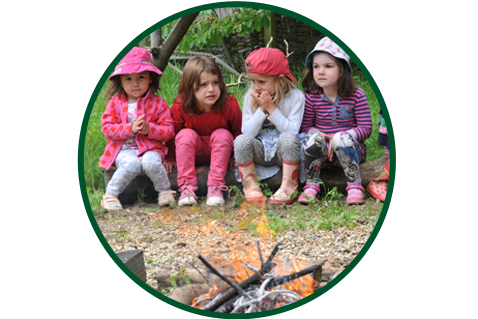
Forest School is a unique approach to children's learning and development, which allows children to explore their natural environment, embracing all weathers. It was initially practiced in Denmark and since then has been adopted by many early years settings across the United Kingdom. Forest school provides the perfect environment for real life and first hand experiences, enabling the child to develop skills for independent thinking through exploration. Children also gain problem solving skills, developing self esteem and independence, as well as learn how to take manageable risks.
There's no such thing as bad weather, only unsuitable clothing

What is Forest School?
A forest school is a special place; it is usually in a designated wood/gathering of trees, or, in a unique area where the children do not usually visit on a day to day basis. There are not many 'rules' in forest school as the learning is play and exploratory based, with rules only for safety reasons.
Risky play is a huge part of forest school, with children being able to play with sticks, climb trees, balance on logs, use tools and whittle sticks. The Early years Foundation stage (2012) says that it is intrinsic that children should be exposed to ome risks, as it enables them to understand and judge the dangers that they encounter, it also encourages problem solving through independent play.

Benefits of Forest School
Forest school aims to connect children with themselves and their environment, encouraging and inspiring them through positive outdoor experiences. It is vital that we encourage the new generations to be active, as childhood obesity is a growing problem in the United Kingdom that threatens the health of young children. Also, with ever more captivating and interesting toys and technology, children are finding staying indoors more exciting. With these advances it is important to include outdoor play and learning in our children's education, not only for the benefits of fresh air and exercise, but, so the future generation do not become unattached with nature.
The Role of the Early Years Professional
The role of the adult is hugely important in forest schools for many reasons. First and foremost, the role of the adult must be to ensure that the children's basic needs are met.
Maslow's hierarchy of needs (1954) states that a child's basic needs must be met before any learning can take place. In Forest School it is vital that children feel warm or cool enough, have enough food and drink, feel loved and secure and be safe. Children who partake in Forest School will go out in all weathers all year round enabling them to learn about their ever changing environment naturally and organically. Therefore, Children who attend Forest School sessions must have appropriate clothing.
Where possible, Forest School leaders must plan challenging opportunities stemming from previous observations and evaluations. In conjunction with this, adults need to supply children with appropriate tools and equipment to enhance children's learning and provide a positive connection with the outdoors.
By modelling desirable behaviour during Forest School sessions, adults will encourage the children to behave appropriately. Adults need to observe and interact with the children, being good listeners, helping and guiding children where necessary. It is the pedagogue's role to know when to intervene and help the child; they must try not to intervene before it is necessary, instead encouraging children to use their independent problem solving skills to help them out of the situation.

